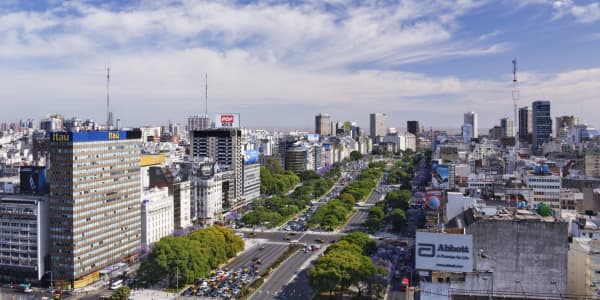
Even the sages gathered at the World Economic Forum in Davos can miss a trick.
Last year, for example, none of the high-level politicians and economists interviewed by CNBC forecast the emerging markets rout, which followed the announcement that the U.S. Federal Reserve was considering reducing its asset purchase program.
Christine Lagarde, managing director of the International Monetary Fund, kicked off the event by (pretty accurately) predicting that 2013 would be a "make or break" year for the global economy.
(Read more: What happened at Davos in 2013)
Not many got it quite as wrong as Hesham Qandil, then Prime Minister of Egypt, who proclaimed "We know where we're heading… this is a transitional period but we have a clear political path," in an interview with CNBC. Sadly, his subsequent ousting and arrest following a military coup showed that he didn't, in fact, know where he was heading.
There was a general failure to spot the strength of the U.S. market recovery – although attendees can be forgiven, given that the struggles in Washington over the U.S. debt ceiling were not resolved until many months after the last Davos shuttle had departed for Zurich airport.
The euro zone managed to struggle through without meeting some of the more dire predictions for its fate made at Davos 2013 – none of which foresaw the resolution of the Cyprus banking crisis via a new "bail-in" method.
Michael Corbat, chief executive officer (CEO) of Citigroup, echoed the views of many when he told CNBC: "I don't think there's a clear path" to growth in 2013.
The general consensus among attendees was to urge caution, with Klaus Regling, CEO of the European Financial Stability Facility, who warned of the "danger of complacency" in an interview with CNBC, one key example.
Of course, global gross domestic product (GDP) growth of 2.9 percent (as current IMF forecasts suggest) is hardly an outstanding recovery – but the amount of that growth from the U.S. and certain European markets like the U.K. and Germany surprised pessimists.
Lord Malloch-Brown, a leading British business figure, former Deputy Secretary-General of the United Nations, and long-term Davos attendee, told CNBC: "Last year there was a lot of focus on Europe because against the odds it had survived, and there were a lot of people talking about the need for Europe to be more competitive in 2013.
(Read more: Scenes from Davos 2013)
"This year, the conversation's going to move on. There will be much more of a focus on the U.S. recovery which will be the exciting new news at this Davos," he added.

One topic where some Davos attendees were perhaps too hopeful in 2013 was China, with the hoped-for reforms failing to materialize and worse-than-expected growth of around 7.5 percent for the year (according to Chinese government projections).
(Read more: Why China stocks aren't as cheap as you think)
Stephen King, HSBC's well-respected group chief economist, told CNBC at Davos in 2013 that the country would make a "really decent recovery" with 8.6 percent annual GDP growth in 2013.
"Anyone connected with China is going to do really well," he said.
Even with more optimism, this year's meeting is unlikely to feature unabashed confidence.
John Studzinski , senior managing director of The Blackstone Group and another Davos veteran, told CNBC: "The world economy is in a much more stable, less volatile place. We have to not just focus on the word 'economy', we have to focus on fundamentals such as issues relating to employment, the working poor, emerging nationalism in Europe and the new middle class."
"I hope this year it's a little less focused on talking heads and economics, interest rates, GDP and stock market performance and more talking about job creation," he said.
- By CNBC's Catherine Boyle. Twitter: @cboylecnbc.





